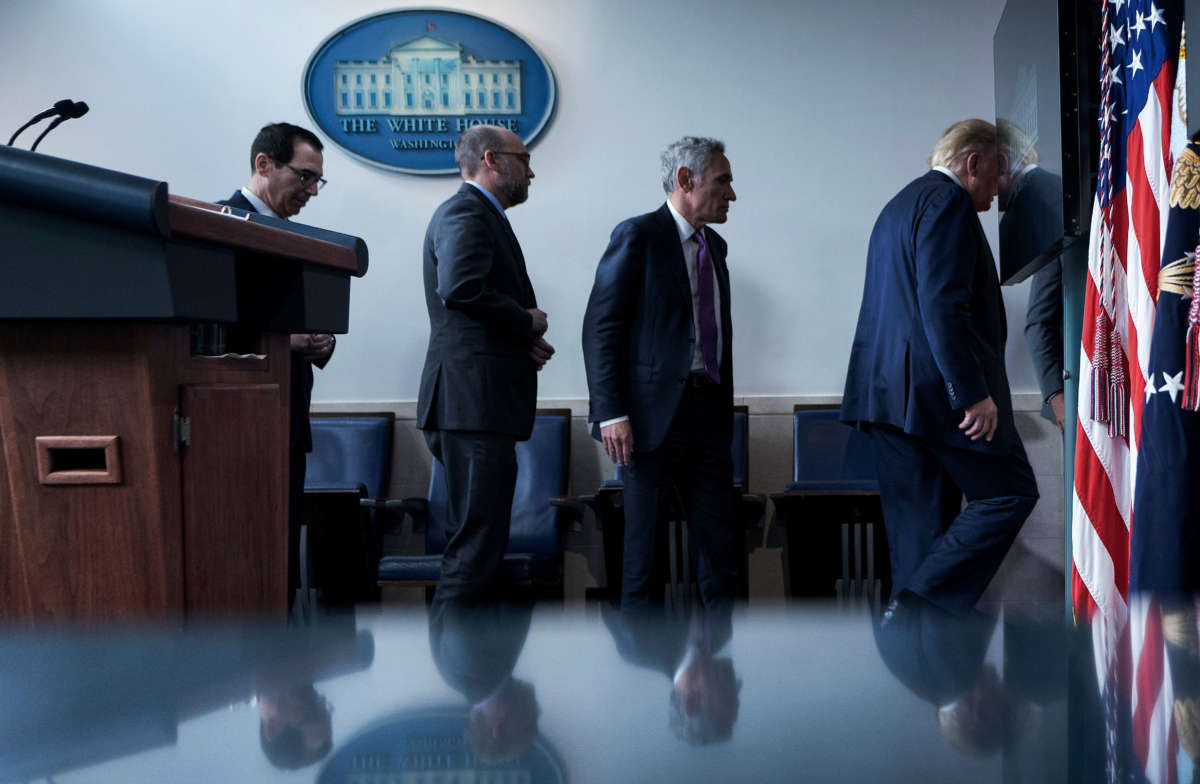A new top COVID-19 adviser to President Trump, Scott Atlas, is pushing the White House to embrace a “herd immunity” approach to the pandemic, which would allow the virus to spread nearly unmitigated through the population while protecting nursing home residents and other vulnerable people, reports The Washington Post.
Building herd immunity in this way is an extremely controversial strategy and has been condemned by epidemiologists and the World Health Organization (WHO). WHO’s chief scientist, Soumya Swaminathan, says that 60 to 70 percent of the population would have to have immunity to COVID-19 to stop transmission. Though the death rate is low, “even if 1% of people who get infected are ultimately going to die, then this can add up to a huge number of people,” said Swaminathan in a WHO podcast. Herd immunity is commonly discussed alongside vaccination, as vaccines lower the rate of transmission by building population-level immunity to an illness, but the form of herd immunity being discussed in the White House does not appear to focus on vaccines.
With 6 million total cases so far in the U.S., that adds up to less than 2 percent of the population that’s had the virus. If 60 to 70 percent of the U.S. population gets the virus, that would add up to hundreds of millions of cases, and over a million deaths at a 1-percent death rate. Even in survivors, there appear to be persistent long-term effects of the virus, like respiratory damage and “brain fog.”
William Hanage, a Harvard professor of epidemiology, likens herd immunity as a coronavirus policy to letting a house burn in The Guardian: Instead of putting out the fire to stop it from spreading house to house, the “government has inexplicably chosen to encourage the flames, in the misguided notion that somehow they will be able to control them.”
Atlas denies that the Trump administration is considering herd immunity, saying in a statement that “there is no policy of the President or this administration of achieving herd immunity. There never has been any such policy recommended to the President or to anyone else from me.”
But the administration has already taken steps that would indicate otherwise, encouraging the reopening of schools and businesses far before infection rates have gone down and expediting testing in nursing homes but discouraging it elsewhere. At last week’s Republican National Convention finale, when Trump formally accepted his presidential nomination on the White House south lawn, the 1,500 audience members were not even given basic screenings. One senior White House official said then that “everybody is going to catch this thing eventually.”
In July, Atlas was on Fox News appearing to promote the idea of herd immunity, saying that “there are other ways to be immune,” referencing a phenomena that some scientists have studied called T-cell immunity, which could explain why some people are hit harder by the virus than others. According to his back-of-napkin math, cases are down in New York city because “it may already have herd immunity,” he said at the time. However, public health experts have said that cases likely dropped in New York because the delayed effect of stay-at-home orders kicked in. Atlas, a neuroradiologist at a conservative think tank, does not have a background in infectious diseases.
By only protecting the elderly in nursing homes, which the Trump administration appears to be doing, the White House seems to be operating under the false assumption that young people are immune to the virus. But there are a host of factors other than age that can make one vulnerable to coronavirus, from underlying conditions like diabetes or asthma to socioeconomic factors like race and income.
The administration says it’s taken steps to protect people with underlying conditions in its Opening Up America Again guidelines, but the plan does not outline specific policy or special conditions for these populations — only that states recommend that they shelter in place and social distance. The guidelines do not consider race and class in their consideration of vulnerable people, defining them only in terms of certain health conditions.
The coronavirus has been particularly deadly for Black and poor communities. Racism and lack of health care access make these communities particularly vulnerable. Because of the vulnerability of some communities over others, some people like former U.K. Labour Party leader Jeremy Corbyn have likened the form of herd immunity that the White House seems to be pushing to a dangerous form of population control and social engineering, with Corbyn calling it “eugenic.”
Others, too, have compared this form of herd immunity to eugenics. In an opinion piece for Al Jazeera, anthropologists and professors Vito Laterza and Louis Philippe Romer write that “It is hard not to read eugenic implications in this kind of thinking: The ‘herd’ will survive, but for that to happen, other ‘weaker’ members of society need to be sacrificed.”
Join us in defending the truth before it’s too late
The future of independent journalism is uncertain, and the consequences of losing it are too grave to ignore. To ensure Truthout remains safe, strong, and free, we need to raise $46,000 in the next 7 days. Every dollar raised goes directly toward the costs of producing news you can trust.
Please give what you can — because by supporting us with a tax-deductible donation, you’re not just preserving a source of news, you’re helping to safeguard what’s left of our democracy.
